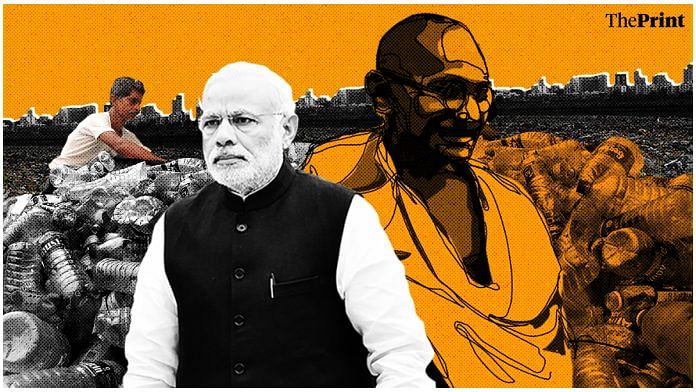After his Swachh Bharat initiative, Prime Minister Narendra Modi now wants to curb single-use plastic in phased manner and eventually eliminate it by 2022. In his Independence Day speech, the PM had asked people to “give up single-use plastic”.
ThePrint asks: Is Modi govt being practical by deciding to curb single-use plastic instead of complete ban?
We don’t have a clear definition of what single-use plastic is
 Hiten Bheda
Hiten Bheda
Chairman of Environment and Recycling Committee, All India Plastics Manufacturers’ Association
The first thing we need to understand about Prime Minister Narendra Modi’s call to ban single-use plastic is that there is no coherent definition of what single-use plastic is. Therefore, we are still confused about the guidelines. The first step should be to provide a proper definition of what constitutes single-use plastic, only then can implementation come into the picture. There are many loose ends here.
It is also very difficult to estimate if the complete ban on single-use plastic is financially feasible since it involves so many products.
Various states have formulated their own guidelines regarding what comes under a plastic ban. In that sense, what is banned in one state can be used in another. There should be a pan-India plan, with correct information and guidelines on what should be banned.
The idea that products hurting the environment should be phased out step-by-step is good, but a more detailed plan is required. Again, it has not been specified which materials/products are hurting the environment the most.
The good thing is that awareness has been created on waste segregation and recycling, but we are far from implementing a plastic ban.
Also read: Why single-use plastic ban missed Gandhi Jayanti date
We have the infrastructure to ban plastic in phases and should focus on that first
 Bharati Chaturvedi
Bharati Chaturvedi
Founder, Chintan Environmental Research and Action Group
First, I don’t think there is going to be a ban. I also think there are more ways aside from a ban to reduce the use of plastic.
Second, we do not have sufficient infrastructure for a complete ban. So, we should focus on a phased reduction of plastic, such as stopping the usage of plastic bags or thermocol plates. What we need to understand is that banning plastic does not just require infrastructure, but also needs a change in human behaviour and psychology.
And finally, one can expect greater research and development investments for alternative materials to plastic and conceptualising product design.
A complete ban is not the only way to reduce the usage of plastic, one should look at industry re-design, pricing and extended producer responsibility. So, multiple strategies need to be devised to reduce and eventually cut our plastic footprint. We have the infrastructure to ban plastic in phases and therefore should focus on that first.
Also read: It’s like demonetisation, plastic industry says about ban confusion, business uncertainty
Banning plastic was never a feasible idea. The trick is to manage its use
 Shashi Bhushan Pandit
Shashi Bhushan Pandit
President, All India Kabadi Mazdoor Mahasangh
Prime Minister Modi is known to take knee-jerk actions on important issues without really thinking about the consequences on people. Now, the economy has forced his government to rethink complete ban on single-use plastic. We need to understand that before talking about whether India has the infrastructure to support plastic ban, there needs to be a basic understanding of the issue and its impact on the environment.
The complete ban on single-use plastic was never possible. It will be extremely difficult to find cheap alternatives in such short notice. For example, if single-use plastic is banned, what will be the substitute for biscuit packets? So, instead of looking at a ban, one should focus on the proper management and recycling of plastic. If done right, it is not dangerous to the environment. For a complete ban, the government needs the support of industries and that will not be possible.
If the Prime Minister actually cared about the environment and climate change, he would not have made such a statement because it is not feasible. The need of the hour is not to ban plastic but to manage its usage.
Banning plastic was a welcome step, and govt should now support new startups who can help
 Ankur Kumar
Ankur Kumar
CEO, Kriya Labs
Prime Minister Modi’s call to ban single-use plastic was an extremely welcome step and I completely supported it. There was a need to start at some point, but now the plan has been shelved. There needs to be a more organised approach to support the ban because it cannot be implemented in one go. The government needs to look for alternatives to plastic products because it is only then that the market can support the ban.
While the government is investing in Startup India and Invest India, it can also facilitate the new startups in this sphere to collaborate with existing industries. The new startups will be provided a certain amount of security by the government, while the old industries will be provided with a ready market. Such a step will lead to a combination of innovation and experience and make a difference. My startup, Kriya Labs, works on technology solutions aimed to convert agricultural waste into pulp, and we would definitely be open to working with the government.
Modi govt has given states freedom to look into prohibitive action on their own & decide on items
 Swati Singh Sambyal
Swati Singh Sambyal
Programme Manager, Centre for Science and Environment
The Modi government has not really banned single-use plastic, it has instead opted for a more phased-out reduction. That is a step-by-step project. I think Prime Minister Modi also realises that there must be more awareness before one bans plastic. He has urged government departments to improve their waste-management system and focus on recycling and segregation of waste. The Centre has also given states the freedom to look into prohibitive action on their own accord and decide which items need to be banned.
So, the focus is more on behavioural change and awareness. A lot of homework needs to be done before banning single-use plastic – checking the condition of drains, sewers and dumps while also listing out various categories of items that need to be banned and items cannot be banned. I believe this phased-out reduction will be quite effective. But the most important thing is that we use the momentum from this campaign and carry it forward and not let it die down, so that we can actually make a difference.
By Revathi Krishnan, journalist at ThePrint




Just like the responsibility of garbage collection lies with the local civic authorities, the responsibility of encouraging recycling also lies with them. It would be practical for the government to encourage private enterprise to set up specialised recycling units, and urge the civic authorities to sell the recyclable material at throwaway price. In fact the whole collection-disposal-recycling should be privatised with civic authorities just making sure the parties perform and public becomes aware.
The message is loud and clear that we must cut down use of plastic and start using reusables, so that the use and throw practice is drastically minimised. Surely, more innovative and eco-friendly materials that can be recycled and finally, disposed of without causing harm to air, water, soil need to be promoted to replace plastic. It is a shared responsibility of both the manufacturers and users. In a demand driven economy as we are today, users can play a major role in cutting down use of plastic.
The manufacturing of plastics should be stopped in phased manner with simultaneous making alternatives available. Sudden ban of anything will collapse the economy like the De-Mo did,
It is not practical / feasible to ban the use of such a universally important product without affordable alternatives being available. It would have led to the chaos of Demonetisation without new currency having been printed. Individuals should be sensitised to make suitable changes in their consumption patterns to at least substantially reduce the use of SUP.